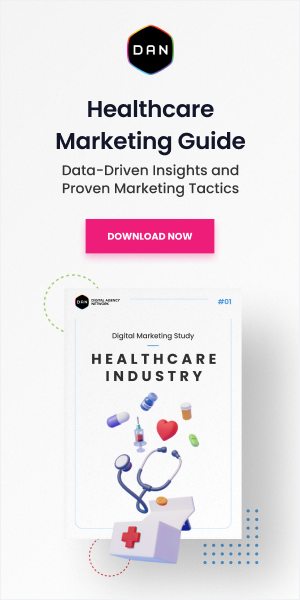
Top 12 Digital Marketing Strategies and Best Practices for the Healthcare Industry
Healthcare is a competitive industry both in small towns and large cities. People have more options than ever for healthcare, so how do you separate your business from everyone else? The right digital marketing strategies for healthcare companies can turn your small practice into a booming business or your hospital to be the number one choice for your area.
Creating a comprehensive digital marketing strategy for hospitals is essential to staying competitive in the healthcare industry. Hospitals, medical practices, and other healthcare entities must be aware of the latest trends and technologies in digital marketing as they look to reach more patients and grow their businesses. A digital marketing strategy for hospitals can help bridge the gap between the healthcare provider and the patient since it is essential for healthcare businesses to be mindful of the sensitive nature of patient information, as well as the need to provide access to important information in a timely manner. Hospitals should ensure to concentrate their digital marketing efforts on initiatives that promote trust, transparency, and compliance with applicable rules and regulations.
Healthcare digital marketing grows and advances as the Internet expands and Google dominates the search engines. We’ve developed 12 tips that can help your healthcare business take the lead and drive patients to your website and business.
Don’t let the competition make the digital marketing moves first learn and build your business.
Digital Marketing in the Healthcare Industry
Digital healthcare marketing is revolutionizing the way healthcare businesses interact with their customers. With the ever-growing power of digital channels, healthcare marketers are able to reach and engage with their target audiences in ways never before possible. From social media platforms to search engine optimization, digital healthcare marketing can help businesses build relationships with potential patients, generate leads, and drive sales.
It’s no doubt that more people are using digital tools to search for doctors, research their symptoms and find medical information. Because of this, having a strong online presence for both your business and your medical staff is crucial. In order to be competitive, healthcare providers must establish themselves as a reliable source of knowledge and be simple to locate in organic searches.

One of the biggest benefits of digital healthcare marketing is its cost-effectiveness. Digital channels are much less expensive than traditional media, allowing healthcare businesses to reach a larger audience without breaking the bank. Digital healthcare marketing also allows for more targeted and personalized messaging. By segmenting their audience, healthcare businesses can send specific messages to different groups that are more likely to respond.
Another benefit we must include is its ability to measure results. With digital tools, healthcare businesses can track the performance of their campaigns in real-time. This data allows them to adjust their strategies and optimize their campaigns for maximum return on investment. Digital healthcare marketing also enables healthcare businesses to quickly and easily test new ideas. With digital channels, businesses can experiment with different tactics and quickly assess their effectiveness.
Top 12 Digital Marketing Strategies and Best Practices for the Healthcare Industry
1. Your Website is Your Digital Hub
Marketing in Healthcare begins with your website. The content, layout, and navigation are top priorities for Google and your patients. If they have trouble viewing it on mobile or finding the pages they need, then they’ll move on to the next listing in the search results.
Your website is the hub for your healthcare digital marketing. When they click on the search results or advertisement that’s where they’re going. It must be mobile-optimized and filled with pertinent information.
They should be able to find the page they want within a few clicks and be satisfied with the information. The ultimate goal is for them to schedule an appointment either online or from their phone. Don’t forget that it must also be compliant with all facets of the Health Insurance Portability and Accountability Act.
2. Chatbots Are Essential!
Chatbots are revolutionizing the healthcare business and making digital healthcare marketing a reality. The use of chatbots in the healthcare industry is rapidly growing, as they are proving to be a valuable asset in improving the customer experience and making healthcare processes more efficient. They are capable of providing automated assistance to healthcare providers, such as customer service, appointment scheduling, and medical advice. They can also provide a more personalized experience to patients, helping them to make informed decisions about their health and well-being. By using chatbots, providers can quickly respond to customer inquiries and provide important information, such as appointment reminders, diagnoses, and medication information. As a chatbot can respond to inquiries regarding a provider’s qualifications, specialties, and availability, finding the ideal doctor for a patient’s needs is another excellent use for chatbots.
3. Focus on Local SEO
There are two types of search engine optimization: general and local. If you’re a business that sells products or services to anyone in Europe, then you’ll focus on national or even international SEO.
Hospitals and doctor’s offices service a specific area or region. It doesn’t matter if people from 500 miles away see your website because unless you provide a specific hard-to-find treatment or specialty. You want people only from within your business region to see your website.
Local SEO involves creating keyword lists that are specific to your area. They usually involve a general term and a geographic term. For example, if you’re a chiropractor from Cardiff, then a potential localized keyword could be “back pain relief in Cardiff”.
Your web content and blogs should also be optimized for local SEO. Your business should have a Google My Business profile, so Google knows exactly where you are, so make sure business listing sites have the correct information. For instance, if you run a healthcare agency in Australia, having accurate location details will ensure that patients can conveniently locate and reach out to your services when in need.
4. Online Reputation Management For Healthcare Businesses
Healthcare providers are now relying on digital healthcare marketing to promote their services and build trust with their patients. To make sure their digital presence is positive, providers need to have an effective online reputation management strategy in place.
ORM for the healthcare industry involves monitoring, managing, and responding to online reviews and other sorts of online content. Companies need to be aware of both the positive and negative comments being made about them online. Also, they must be actively engaging with their clients and responding to any feedback or review they get. This will help them build trust with their patients and ensure that their brand is seen in a positive light. With the right online reputation management strategy, healthcare providers can gain a competitive advantage in the healthcare industry.
5. Invest in Pay Per Click Advertising
SEO isn’t a fast process. If you’re starting out with little content or optimization, then it will take time to create the content and for Google to recognize it. If fact, it can take weeks or months to see a significant ranking change for specific high-value keywords.
Pay Per Click advertising requires a budgetary investment to advertise on the Internet. The most common PPC platform is Google ads, but many social media platforms such as Facebook also have PPC programs.
Google has search, videos, shopping, and display advertising. Search ads show up above and below search results. It’s prime real estate as it’s the first thing people see. Video ads show up on sites like YouTube.
Display advertising is the picture ads seen on websites. You must provide a budget for each ad campaign and then go into an auction with other people seeking PPC keywords. It’s possible to send considerable traffic to your site if the campaign is run correctly.

6. Keep Up to Date with Google Changes
Google uses a complex algorithm to determine search engine rankings. Many years ago, it was easy to use tricks to earn the top spot for specific keywords, but dozens of updates later there is no way to “trick” the algorithm.
Google wants to provide its customers with the best product, so they regularly update the algorithm to improve the search experience. Over the past several years, the company implemented artificial intelligence into the algorithm to better learn the intent of searches.
Google recently implemented Bidirectional Encoder Representations from Transformers (BERT). BERT helps to understand the conversational language used in search queries. Many queries now come from vocal queries through a cell phone or personal assistants such as Siri and Alexa.
John Lincoln from Ignite Visibility share the ways the new Google BERT Update impacts your SEO:
The goal is to better understand the subtle nuances of language to provide more accurate search results.
Algorithm changes can have a significant impact both positively and negatively on SEO efforts. It’s important to keep up to date with algorithm changes so you can adjust your SEO plan.
7. Email Marketing Keeps People Coming Back to Your Site
Email marketing is one of the oldest methods of digital marketing available and often provides the best return on investment. Contact forms and newsletter signups are a way to keep your potential patients up to date on what’s going on with your business.
When they give you their email address, you know they’re interested. If you add a new doctor, new machinery or procedures, then send out an email. Your weekly or monthly newsletter can have information about your practice or general healthcare information.
Use read more links to bring people from the email to your site. Keep them engaged and next time they need your services, they’ll remember your practice or hospital.
8. Social Media Engages Your Patients
Social media has exploded on the scene and is vital to advancing your marketing efforts. Healthcare digital marketing trends show it’s an important part of patient research. Everyone has a Facebook page and other social media such as Instagram and Twitter.
Use your social media to keep people up to date on hospital happenings. Many times, people leave messages and comments on your page, both positive and negative. Respond to both and try to turn the negative to a positive through excellent customer service.
Social media has made it more difficult to reach existing followers and get new followers. You may need to provide a budget for sponsored posts to reach more of your existing patients and reach out to other potential patients.
9. Don’t Underestimate the Influence of Landing Pages
When you want to focus on a specific product or service, then you may have a landing page created that directs people using your digital marketing avenues to it. The makeup of a landing page is important in moving people to the next stage of their journey.
It should include a description and any special offers or discounts you’re having about the product or procedure. It should an effective call to action that moves people to call or contact you for more information or set up an appointment.
Landings pages are vital in providing a snapshot of something specific that might be lost in the content of your site otherwise.
10. Create Authoritative Content
Many potential patients don’t know they need healthcare services. They have symptoms and decide to look them up on Google. They want information and not specifically to look for a doctor.
If your website has great informational blog posts and other content that answers their questions, then you insert yourself as an expert. Google wants information that provides expertise, authoritativeness, and trustworthiness.
Lily Ray, the director of SEO at digital agency Path Interactive, explains why this is important:
If you have lots of good information on your site in relation to the areas you practice, then you’ll provide the answers and you’ll be front of mind when they seek help or treatment.
11. Keep Track of Website Data
Digital marketing can help your business, but how do you know its working? Return on investment for digital marketing can be difficult to gauge unless you use a program like Google Analytics. It’s a free program provided by Google that helps track traffic and user interaction on your website.
You can see where your traffic is coming from such as Google Search, Facebook, etc. You can see the most popular pages and what pages people leave your site on.
There are also programs that can track your rankings for specific keywords over time.
12. Diversify Your Digital Marketing Strategies
It’s easy to put all your digital marketing efforts into one basket. Many businesses think they can focus on one and then move on to the next later, but in today’s competitive business climate, diversification is best.
We also listed the best healthcare digital agencies in the USA for helping you to find the right partner.
Instead of just focusing on SEO, PPC or social media, use all three. You don’t have to use all these methods above, but if you diversify then if one isn’t working, then others can shore up the traffic. It’s best to choose which avenues sync with your marketing plan and go from there.
You’re still getting traffic from other methods as you tweak the one that isn’t working.
Build Your Healthcare Business Online
Everyone uses the Internet for everything from searching for illness symptoms, doctors and more. If healthcare organizations are to keep up with the competition, then they need to enact digital marketing strategies that build and grow their business.
If you want to learn more about healthcare digital marketing, check our brand new best healthcare marketing agencies in the UK directory.


















